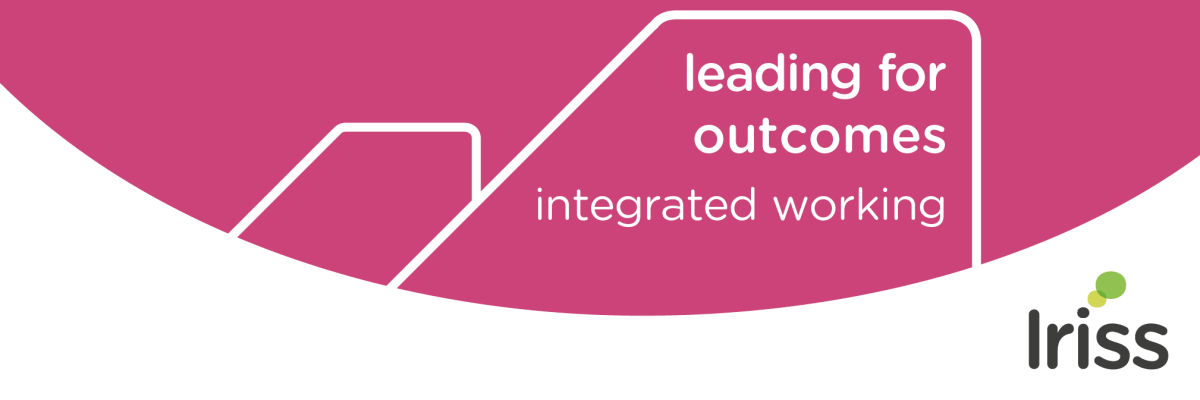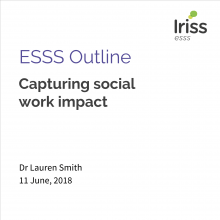What is this guide?
This guide forms part of the Iriss Leading for Outcomes series. The guides are designed to support team leaders, managers and trainers to lead teams in the adoption and implementation of a personal outcomes-focused approach. The initial guide, Leading for outcomes: a guide, gives general evidence-based advice and support in leading this approach within the context of adult services. We have also produced a number of companion guides that complement and add to the content in the main volume. This companion guide focuses specifically on the topic of practising in an outcomes-focused way within the field of integration. Other companion guides focus on parental substance misuse, dementia and children and young people.
Following the announcement in December 2011 of the Scottish Government plan to create health and social care partnerships through associated legislation and guidance, effective integrated working within these partnerships is likely to have a high profile. It is essential however that other key players such as housing and the range of independent sector organisations are also embraced within the concept of integrated working. Moreover integrated working involving professionals across health, housing and social care is of course not new. There have always been elements of working that involve a range of different professionals, informally or through a variety of multi-professional and multi-agency teams. Areas where integrated working has been a particular focus include homelessness, intermediate care and reablement, and community mental health and learning disability. Often these services are providing support at the interface between home and hospital or are seeking to provide support to individuals with complex needs. Teams likely to operate with elements of integrated working include rapid response services, intensive support at home services, home from hospital teams, community rehabilitation teams and mental health outreach services.
An example: Intermediate care
Although the definition of intermediate care can be elusive, it is generally accepted as a generic term that covers a wide range of services that support adults and help to prevent unnecessary hospital or other institutional admission, or help to facilitate early hospital discharge.
Intermediate care services can be described as those services that do not require the resources of a hospital but are beyond the scope of mainstream community care services. They are generally provided on a short-term basis at home or in a care home setting for people who require some degree of rehabilitation and support. They can be provided solely by one agency, but frequently consist of multi-disciplinary teams with professionals from health and social work and sometimes third sector provision.
Intermediate care is at the frontier of integrated working, whether between hospital and community, or between health and social care agencies. Integrated working (sometimes referred to as whole systems working or partnership working) is an essential component for positive outcomes for individuals requiring support. Intermediate care cannot operate in isolation from the wider service community, and integrated working will be taking place on a daily basis whether as part of a multi-disciplinary team or as part of a network of care providers linked by care management or similar arrangements.
Intermediate care services are generally well placed to adopt an outcomes approach to their work, although they may use different terminology to describe their approach. These services usually include rehabilitation and reablement elements and will work with people who use services to identify and work towards ‘goals’, ‘targets’, or ‘independence’. They frequently provide person-centred and integrated health and social care services to support adults with community care needs.
The parent guide provides an account of the introduction of the shift from a service-led to an outcomes-focused approach to delivering health, housing and social care services in Scotland. It highlights the vital role of leadership to the success of an outcomes-focused approach. This guide will focus on issues specifically relevant to the emerging context of integrated working across health, social care, housing and beyond. Following the announcement of December 2011, the focus on integrated working will shift from the limited number of integrated arrangements in recent years to the mainstream.
An outcomes-focused approach requires a significant culture shift at both an individual and organisational level. It involves questioning embedded ways of working and staff need clear direction and support on what it means to practice in an outcomes-focused way. You may wish to consider what advice and support you can call on (for example Training Section or Organisational Development Team) to help staff and teams develop new skills and innovative approaches to practice.
‘Culture change is, without doubt, the most difficult and least understood area of organisational life.’
(Qureshi and Nicholas, 2004)
Who is the guide for and how can it be used?
- The guide is aimed at those committed to leading an outcomes-focused approach to integrated working, including team leaders, managers and those in training roles. It should be relevant to those from a range of health, housing and social care backgrounds.
- The guide provides a framework for training and is designed to be adapted to the time and resources available and to the specific needs of your team. The guide builds on the material offered in the parent guide. We suggest you familiarise yourself with this guide before leading with this more specialist guide. Cross-references are made to the parent guide as appropriate in this document.
The guide includes a range of training materials and exercises and is divided into three parts. Part one focuses on understanding what is meant by integrated working. Part two focuses on understanding and promoting a personal outcomes approach within integrated working across health, housing and social care and beyond. Part three focuses on putting the approach into practice and on ensuring it is sustained.
General note to exercises
Depending on the particular group of staff that is involved in the training it may be helpful to change the mix of the groups between exercises.
This can be particularly helpful if there is a variety of people in terms of position, knowledge and experience.





